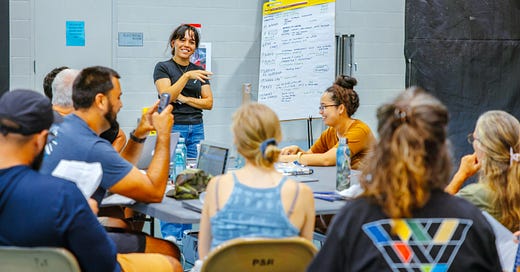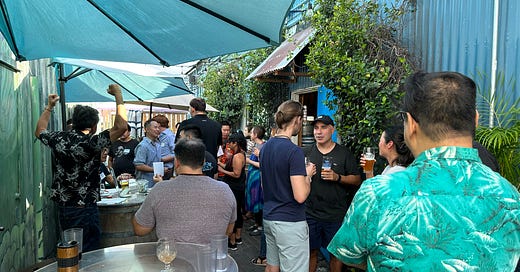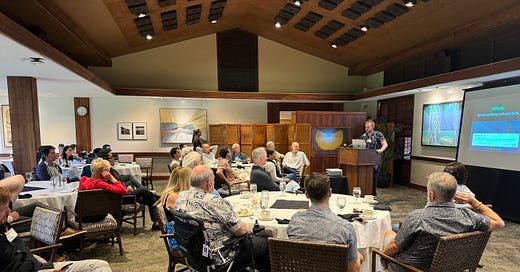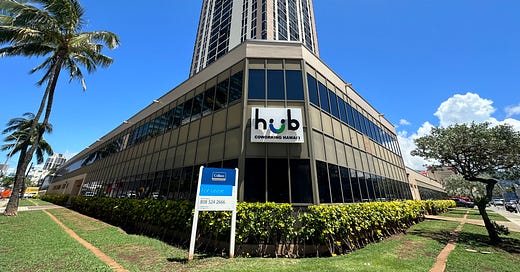
AI Hackathon to Explore Ethical, Entrepreneurial Solutions to Island Challenges
Artificial intelligence is everywhere. Purple Mai‘a hopes to tap the technology to spark innovation that empowers local communities.
My 19-year-old son Alex announced his run for office on Saturday. I feel so very proud. And so very old.
He’s a brilliant kid. Since he was little, he’d pick a challenge, run at it full speed, and grind away until he figured it out. Ukulele and piano. PC building. Gardening. Video production. Mobile app development. And—like any civically aware and engaged member of Generation Z—he is committed to making the world a better place.
Unlike his father, who at best was a late bloomer, he is also working to find his place and path as an ʻōpio and kanaka maoli. And a small part of that awareness, respect, and pride comes from his early encounters with the Purple Mai‘a Foundation.
The Honolulu-based non-profit was already two years old by the time I’d discovered it. While open to all keiki, Purple Mai‘a was rooted in indigenous knowledge and focused on providing tech education opportunities for native Hawaiian youth. So Alex signed up for a workshop teaching combining hardware (littleBits) with software (Minecraft) to teach basic principles of computer science.
That was eight years ago. Alex was 11 years old. Look at that face!
Hard to believe we’re already here:
Anyway. My son has grown and evolved quite a bit over the last decade, along with Purple Mai‘a. I’ve enjoyed witnessing both push forward, and I’m very excited about what both will accomplish in the next year.
It’s no surprise, then, that in this year of artificial intelligence, Purple Mai‘a is organizing an event to harness a transformative—and sometimes scary—technology for good.
Purple Mai‘a origins
Purple Maia was founded in 2013 by Olin Lagon, Donavan Kealoha, and Kelsey Amos—three amazing people I greatly admire—with the initial goal of teaching native Hawaiian children how to code.
“We started off as an after-school coding program for kids,” explained program director Victor Lee. “We actually make our 10-year anniversary next May.”
A lot happened in the interim—including the mid-pandemic launch of the FoundHer business accelerator program for women.
“Then we expanded into entrepreneurship and design thinking, and more recently, I came on board to help set up a workforce development program,” Lee said. “So right now we have pretty strong pillars in terms of coding, an accelerator program, entrepreneurship, and workforce development arms.”
The organization’s vision has expanded to broadly empower kanaka maoli and Hawaii residents with 21st century skills. And, as the website explains, “We wanted to fundamentally change the perception that there is anything contradictory or unusual about kanaka maoli and other people of Hawaii being excellent in areas like technology and entrepreneurship."
Lee has been with Purple Mai‘a for more than four years. David Pickett, the organization’s chief technology officer, started as a coding instructor in 2016. And I spoke with them both about the AI hackathon, taking place this weekend.
Venturing into AI
There isn’t an industry that hasn’t been grappling with the sudden and ubiquitous availability of artificial intelligence. (It’s one of the fields I cover as emerging tech editor of Decrypt.) So in some ways, that Purple Mai‘a would explore the technology is no surprise.
“One of my favorite things about our educational organization is the encouragement to go and learn,” Pickett said. “In tech, you always have to be learning to keep up anyway, but I think as an educational tech organization, we're encouraged and incentivized to learn because it helps our students, and it helps our community.”
Purple Mai‘a employees were already using AI tools, and partner organizations were asking how to integrate AI into their work, he explained. And they weren’t alone.
“There's been so much buzz in AI and AI tools,” Pickett said. “I was saying to folks in our directors call, it'd be great if we could just take a weekend and try to build some stuff—we'd already heard use cases from some of our employees of things they want.”
Perhaps a chatbot that could answer employee questions about company policies, he said, or a way to provide resources for people affected by the Maui fires.
“Can we curate a library of these grants and loans and opportunities, so if somebody doesn't want to scroll through or search through everything, they can just naturally ask a question and have it be trained on that set of knowledge?”
But potentially more interesting, Pickett said, were the ethical questions around AI.
“People were asking, ‘What are we allowed to use? What is good policy? How do you make sure you're not oversharing information?‘” he recalled. “The other thing I thought was really interesting was, I wanted to make sure other nonprofits out there knew what kinds of resources are being provided for nonprofits to get into tools like this.”
Pickett said there were dozens of examples of other partners and projects in Hawaii enlisting AI in their work.
“We have other folks out there in Hawaii and in our network doing things that are not just [Large Language Models], not just ChatGPT, but machine learning,” he explained.
Two examples he shared included Shifted Energy and Hohonu.
“They do a lot of data science and machine learning around grid usage, energy usage and energy storage,” Pickett said of the former, co-founder by Purple Mai‘a board member Forest Frizzell. Of Hohonu, he said, “They do machine learning around tide sensors and water sensors.
“We have another company we're working with that wants to do machine learning related to soil spectroscopy,” he added. “So we've invited several people to come give talks at this event and work on their projects, and maybe look for team members to come and help out.”
Hawaii Bulletin supporters can watch the entire interview with Pickett and Lee!
The hackathon program
The Purple Mai‘a AI hackathon is called “Build4Good,” and spans three days—the evening of Friday, Dec. 8 through Sunday, Dec. 10—at Hālau ʻĪnana. If you can’t attend in person, a livestream will also be provided via Zoom.
(There is also one pre-hackathon event tonight at 6 p.m.!)
Pickett explained that the hackathon will be a hybrid between reverse-pitching challenges for teams to self-organize around, and providing space for participants to pitch their own ideas.
“We're basically thinking of having four or five template challenges—stuff that we've heard from partners that you could make progress on in a weekend, stuff that multiple teams might want to get together on,” he said. "And then we will also give a chance on that first night—Startup Weekend style—to go up and pitch an idea and form a team.”
Pickett emphasized that the hackathon aims to attract community members from diverse backgrounds and skill sets, and participants do not have to have any technical or software development experience.
'“We've put together some example resources, example tools, and some suggestions,” he said, noting that low-code and no-code solutions will be an option.
The goal is to spark novel, ethical applications of AI rather than advanced technical builds, Pickett said. The event will conclude with audience voting for standout projects, with no judges and a few modest prizes. Instead of competition, the framework is collaboration.
"If people can be more comfortable adopting some of these new technologies, these can often level the playing field—it's not a scary thing to get into, it lowers the barriers of entry,” Lee said. “We're hoping that we can get more folks participating in our upcoming hackathon, learn some cool technologies, and network with some cool folks and the community.”
Speakers include Lagon of Shifted Energy, Brian Glazer of Hohonu.io, Matt Popovich of Legislature.ai, Ananda Cobb from Google, and Alexandru Petrescu from Meta. “Build4Good” sponsors include Kamehameha Schools, Hawaiian Telcom, and T-Mobile.
To register for the event, click here.




















